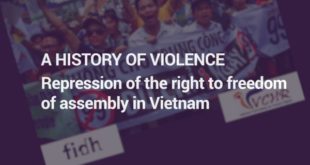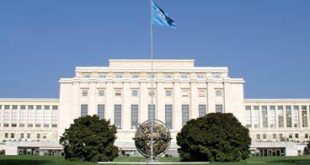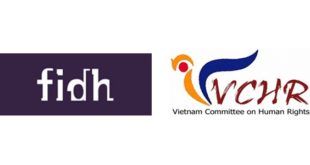Unified Buddhist Church of Vietnam
APPEAL FOR
DEMOCRACY IN VIETNAM
on the occasion of the 4880th Anniversary of our
founding Fathers the Hung Kings
and the dawning of the Third Millennium
Buddhism came into the world to deliver all creatures from suffering. The emergence of Buddhism 2,544 years ago represented a formidable advancement in the thinking and practices of the times, both in Indian society and in the world at large. It stressed the path toward mankind’s liberation: liberation from ignorance, freedom from fear and enslavement to idolatry, dogmatism and fanatical ideology, emancipation from tyranny and the injustices of all social systems. During his lifetime, Buddha’s teachings defeated all contemporary doctrinal schools and trends of nihilism, materialism, skepticism and determinism, placing the human being at the centre of society and the universe, endowed with the potentiality to free himself and emancipate his fellows. Buddhist doctrine has never preached the renunciation of society. On the contrary, Buddhists always seek to respect and protect the human being, actively opposing all forms of social injustice and inequality that trample on the people’s right to life, hinder spiritual progress, prevent Buddhists from fulfilling the Boddhisattva’s vow to save humankind and realize Compassion, Tolerance, Wisdom and Strength, and impede them from attaining Enlightenment.
From this guiding principle of salvation, Vietnamese Buddhism developed a dynamic tradition of engagement in defending the Vietnamese people and nation. The history of Vietnamese Buddhism, inextricably interrelated with Vietnamese history over the past two thousand years, has repeatedly demonstrated that the mutually-reinforcing principles of Protecting the People, Protecting the Nation and Protecting the Dharma [Buddhism]constitute the lodestar of Vietnamese Buddhists’ actions and way of life. One of the earliest Vietnamese Buddhist sutras, Luc Do Tap Kinh (Six Ways of Liberation) transcribed by the monk Khuong Tang Hoi in the 2nd Century AD reflects this spirit of engagement: “When the Boddhisattva [enlightened man] hears his people lamenting, he brushes away his tears and throws himself into the combat against tyranny to save them from suffering”. Of authoritarian rulers who oppress and persecute the people, the Sutra declares: “Savage wolves cannot be tamed. Thus, tyrants cannot be kings”. In his book Ly Hoac Luan (Dissipating Doubt) written in the second century AD in Giao Chau (former Vietnam), the scholar Mouzi spoke highly of Vietnamese Buddhism whilst criticizing the alienating effects of cultural values and ethics imported from China [which sought to assimilate Vietnamese culture as part of its expansionist policies]: “The essence of Buddhism is that it can be used at a domestic level to develop love and respect for one’s parents, at a national level to educate and shape the people, and at an individual level to develop self-control”.
This perception inspired countless resistance movements against foreign aggression and ideological domination throughout our history. It was the driving force of the struggle for self-determination and the survival of Vietnamese cultural identity, for the freedom, welfare and happiness of the people. The annals of history relate the struggles of the two Trung sisters (40 AD); the nine uprisings of Khu Lien, Chu Dat, Luong Long, Khong Chi and Tru Thien Tuong quan (throughout the 2nd Century AD) ; Trieu Thi Trinh and her brother (248 AD) ; the foundation of the independent state of Van Xuan under Ly Nam De (544 AD) etc. All these movements paved the way to the development of a flourishing Vietnamese nation under the Dinh, Le, Ly, Tran and latter Le dynasties.
Yet today, as countries all over the world are racing to develop increasingly prosperous, free and democratic societies, our country remains paralyzed and poor and our people stifled and oppressed. In his Message for the Lunar New Year in 2001, the Most Venerable Thich Huyen Quang, the UBCV’s Patriarch and Head of the Institute of the Sangha resumed this in one sentence: “We have endured 35 years of war followed by 25 years [under the present regime], deprived of human rights or religious freedom !” A total of sixty miserable, dark years that have led us to this impasse with no possible means of escape.
This tragic situation persists because it is supported by three factors:
1. A pretentious, self-absorbed government that rejects all alternative opinion, resulting in a one-Party, authoritarian regime;
2. A government that excludes the people and rejects their legitimate demands for human rights and civil liberties, resulting in a ruthless, repressive dictatorship;
3. A government that imports everything from abroad, from its ideology to the organizational structures of the State apparatus, and imposes it unilaterally, resulting in the total disruption of Vietnamese society and civilization. This has reduced our people to cultural alienation and slavery, provoking the decay of moral values and the nation’s decline.
The Unified Buddhist Church of Vietnam has inherited this tradition of engaged Vietnamese Buddhism both in doctrine and action, succeeding to a twenty-century-long heritage of building and protecting the nation. Today, the UBCV cannot stand idle and watch with indifference as our country plunges into a profound crisis and our people sink into poverty, deprived of their fundamental freedoms and human rights. We therefore solemnly call upon Vietnamese from all walks of life regardless of their political opinions or religious beliefs, as well as all UBCV monks, nuns and lay-followers to mobilize their energies and rally together in a common movement to seek radical solutions to the grave problems threatening our country today.
The Unified Buddhist Church of Vietnam considers that:
– To counter the current trend of one-Party dictatorship, a popular alliance composed of different religious and political tendencies should be formed to lay the foundations of a democratic and pluralist government. Specifically, Article 4 of the Constitution [on the supremacy of the Communist Party and Marxist-Leninist doctrine] should be abolished. Vietnamese culture and patterns of thinking, with their traditions of freedom and tolerance dating back to the times of our Founding Fathers, the Hung Kings, should retrieve its supreme position in society, thus stimulating the emergence of this broad-based popular alliance;
– To counter the entrenched control of the totalitarian regime, all UN human rights instruments and international covenants on political and civil rights to which Vietnam is a party must be fully implemented. Concretely, freedom to form associations should not be subjected to approval by the Fatherland Front, which is a political tool of the Vietnamese Communist Party (VCP); freedom of expression should not be subordinated to Marxist- Leninist doctrines and thinking; freedom of the press should include the right to publish privately-owned newspapers independent of VCP control; freedom to form free trade unions outside VCP structures to protect worker rights should be fully guaranteed. The respect of these fundamental freedoms will safeguard the free expression of the people’s democratic aspirations and the exercise of their right to life;
– To counter the blind imposition of an alien, imported ideology upon all aspects of the society and state, the renaissance of a tradition-based Vietnamese civilization should be encouraged. This civilization should uphold the national cultural heritage while remaining open to cross-cultural communication, with the capacity to absorb the quintessence of cultural currents from all over the world to enrich its own culture.
In the light of the three observations and counteractive remedies described above, the Unified Buddhist Church of Vietnam calls upon, and pledges its full support to all individuals or organizations that seek to realize the eight-point political programme for national salvation underlined below:
1. Build a tolerant, peaceful, pluralist and egalitarian society, one that refrains from internal and external warfare, governed by democratic institutions within a multiparty system;
2. Dismantle all discriminatory, antidemocratic mechanisms of control, notably the threefold mechanism of the ly lich (curriculum vitae), ho khau (compulsory residence permit)andthe network of cong an khu vuc (local security police). Organize free and fair general elections under United Nations’ supervision to elect a National Assembly truly representative of the people; guarantee universal suffrage and the right to run for office of all independent candidates and political formations outside the VPC. Separate the powers of the executive, legislative and judiciary organs and build a society grounded on the rule of law, based on the principles enshrined in the UN Universal Declaration on Human Rights and the International Covenant on Civil and Political Rights;
3. Definitively close down all Reeducation Camps. Release all political prisoners and prisoners of conscience detained in northern Vietnam after the 1954 Geneva Agreements and in southern Vietnam since 1975, and encourage all former prisoners with specialist skills and knowledge to participate in the process of national reconstruction. At the same time, encourage all professionals, intellectuals, scholars, business leaders, individuals and organizations within the Vietnamese exile community who left Vietnam as “boat people” after 1975 to return home and contribute the techniques and experiences learned in advanced countries to rebuilding their homeland. Repeal all arbitrary legislation and restrictions on religious freedom, and prohibit the practice of “administrative detention”;
4. Guarantee the right to private property, free enterprise, and the right to establish free trade unions. Accelerate policies to industrialize agriculture and modernize the rural economy, and improve the living standards of the peasants and farmers, who form the potential of our nation. Abandon the “market-based but socialist-orientated economy”. The manifest failure of the outdated socialist economy to generate prosperity and growth after a 74-year experiment in the Soviet Union provoked the enmity of its people and led ultimately to its demise in the early 1990s. Develop the free market sector in accordance with Vietnamese societal norms; stimulate the development of a knowledge-led economy and protection of the environment. Embrace the trend towards globalization as a means of enhancing sustainable development and promoting global peace and security, but combat the serious dangers posed by the current economic globalization process, which promotes free trade without due respect of human and worker rights. Concentrate all efforts on reducing the widening gulf between the rich and poor, which is alienating our people and splitting Vietnamese society apart;
5. Protect our territorial sovereignty. Make a clear separation between politics and the military; the army, security and secret services should not be used as instruments of any one political party. Reduce the manpower of the armed forces to that of normal peacetime strength. Reduce the military budget and transfer excess spending to education and health. In the field of education, urgently train people of talent and specialists capable of restoring the nation’s prosperity; encourage the emergence of a young transitional generation – young people who can find a transitional path
[towards democracy]between the aspirations of the old, revolutionary generation, partisans of war and anachronistic class-struggle concepts which divide and paralyze the people on the one hand, and the modern preoccupation with consumerism, money-worship and the daily pressures of making ends meet on the other hand. Health access must be improved. Priority should be given to solving the grave problem of child malnutrition and improving health infrastructures in rural areas;
6. Abolish all degrading forms of imported culture and ideologies that pervert Vietnamese spiritual and moral values. Promote the development of a vibrant, traditional Vietnamese culture based on a spirit of openness, creativity and the capacity to absorb the richness and diversity of cultures from all over the world. Uphold the fundamental moral values of Humanism, Wisdom and Courage exhorted by our ancestors. Guarantee social justice, the equal status and full participation of women, nondiscrimination between religions; respect the autonomy and cultural differences of ethnic minorities; protect the interests of foreigners living and investing in Vietnam through due process of law, on the basis of reciprocity ; guarantee the rights and dignity of Vietnamese living abroad ;
7. Respect the territorial sovereignty of neighbouring nations. Promote a policy of friendship, dialogue and cooperation on an equal footing with neighbouring countries in all economic, cultural, religious and social domains. Consolidate efforts to promote peace, security and prosperity in the Asia-Pacific region. Join with neighbouring countries in a common effort to foster the values of Asian humanism. By maintaining mankind’s central place within society, we can prevent the free market from becoming a slave market where human beings are reduced to simple commodities of trade;
8. In foreign policy, uphold the Vietnamese tradition of friendly and peaceful relations, and implement “tam cong” (“winning the hearts”) diplomacyin relationships with countries around the world. Promote dialogue, cooperation and mutual aid in order to bring reciprocal benefits to one and all without sacrificing national identity and sovereignty. Apply this policy as basis for accelerating economic growth and expanding industrialization on a parallel with social progress, in order to catch up and keep pace with the civilized, progressive and prosperous democratic nations of the world at the dawn of the 21st century.
In order to create favourable conditions to put into practice the above three observations, three counteractive remedies and the 8-point political programme to save our nation,
The Unified Buddhist Church of Vietnam calls upon Vietnamese intellectuals and caring citizens from all walks of life, regardless of their political opinions or religious beliefs, and first and foremost upon dignitaries, monks, nuns and lay-followers at all echelons of the Unified Buddhist Church of Vietnam, at home and abroad, to unite with us in a common dialogue in order to transform our vision into a reality. Thus, we can help bring Vietnam’s long, dark night to an end and usher in a bright, new dawn for our S-shaped country at the beginning of this new millennium.
The Unified Buddhist Church of Vietnam also calls upon people all over the world who cherish justice and democracy, all concerned governments, international institutions, human rights organizations, democracy movements and labour movements to support this programme for democracy and help to realize it rapidly in Vietnam.
On behalf of the Bi-cameral Institutes [Institute of the Sangha and Institute for the Propagation of the Dharma] of the Unified Buddhist Church of Vietnam,
Buddhist Era 2544
Thanh Minh Zen Monastery, Saigon, 21st February 2001
(Signature and Seal)
Sramana THICH QUANG DO
(Translated from the Vietnamese by the International Buddhist Information Bureau)
 Quê Me Quê Me: Action for democracy in Vietnam & Vietnam Committee on Human Rights
Quê Me Quê Me: Action for democracy in Vietnam & Vietnam Committee on Human Rights




